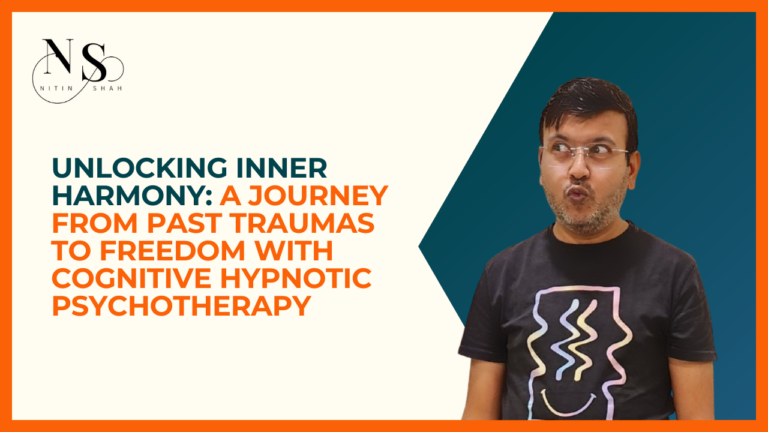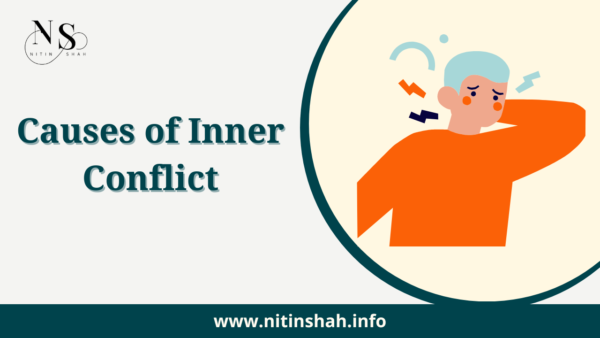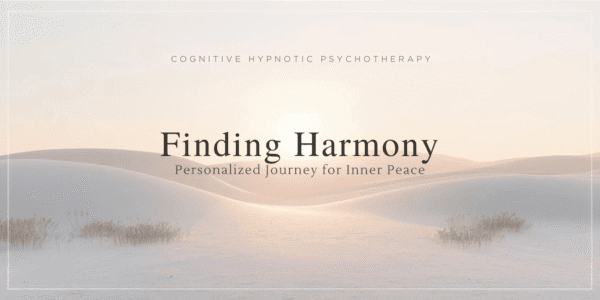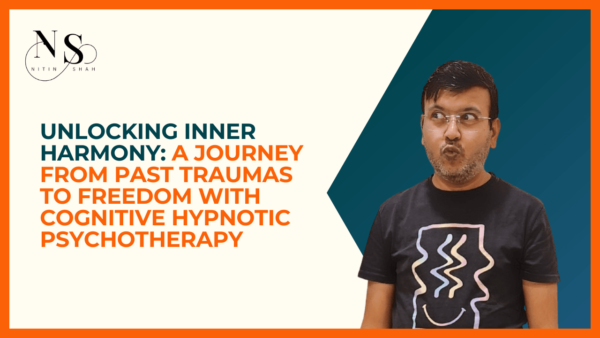Embarking on the path to inner harmony means unravelling the knots of past traumas that echo in our present. In this exploration, we delve into the intricate dance between our history and the emotional struggles we face today. But fear not, for we uncover a transformative ally: Cognitive Hypnotic Psychotherapy. Join us as we navigate real-life stories, explore the tapestry of emotions, and illuminate the path towards resolution and personal growth.
Understanding Inner Conflicts
Emotional Turmoil and Its Manifestations
Imagine your emotions as a stormy sea, each wave carrying conflicting feelings. It’s that tightness in your chest, the lump in your throat, and the unspoken battles within. Emotional turmoil, the silent chaos, manifests physically—stress, anxiety, even unexplained tears. Understanding this emotional turbulence is the first step to reclaiming inner peace.
Indecision and Decision-Making Paralysis
Have you ever stood at the crossroads of decisions, frozen by conflicting desires? Inner conflicts create a fog that clouds your ability to choose, leaving you paralyzed. This indecision not only affects your choices but erodes your confidence in them. Imagine the liberation of confidently navigating life’s crossroads.
Self-Sabotage and Physical Symptoms
Sometimes, without realizing it, we become our own saboteurs. Inner conflicts manifest in self-destructive behaviors, echoing the unresolved battles within. This self-sabotage, accompanied by physical symptoms like headaches or stomach cramps, intensifies the struggle. Imagine breaking free from this cycle and embracing self-supportive habits.
Impact on Interpersonal Relationships
Inner conflicts cast shadows on our relationships, leading to communication breakdowns and unexplained emotional reactions. Picture building connections free from the echoes of unresolved battles, where communication flows effortlessly, and understanding is a cornerstone.
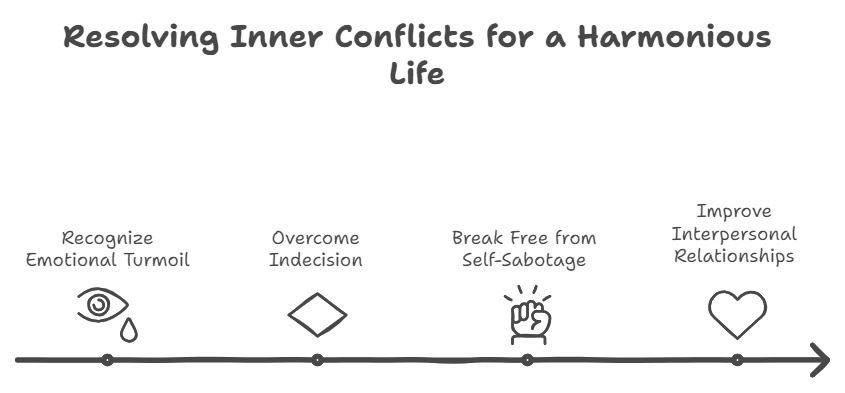
The Link Between Past Traumas and Inner Conflicts
Definition and Types of Traumas
Traumas are not just wounds; they are echoes of the past that linger in our emotional landscape. From acute incidents to chronic struggles, they take many forms. Understanding trauma goes beyond visible scars; it involves recognizing the emotional wounds that shape our present experiences.
How Past Traumas Manifest in Present Inner Conflicts
Unresolved pain, buried memories, and unhealed wounds—these are the architects of present inner conflicts. Past traumas, when unaddressed, influence our thoughts and behaviors, becoming the silent puppeteers of our emotional struggles. Imagine cutting these strings and reclaiming control.
Case Studies and Real-Life Examples
Stories hold immense power. Real-life examples demonstrate how past traumas affect current inner conflicts. Consider someone who faced trauma in their youth; without resolution, it may manifest as fear of intimacy or a constant need for control. Witnessing these journeys helps envision your path to healing.
Cognitive Hypnotic Psychotherapy: An Ally in Your Journey
Introduction to Cognitive Hypnotic Psychotherapy
Enter Cognitive Hypnotic Psychotherapy, a gentle guide through the labyrinth of your emotions. It’s an approach that seamlessly weaves together various therapeutic techniques, using hypnosis as a tool to integrate cognitive, behavioral, humanistic, and psychodynamic elements.
Unifying Different Psychotherapeutic Approaches
This therapy is a harmonious blend of different therapeutic approaches. It recognizes the unique nature of your journey, adapting to your needs. Picture therapy designed specifically for you, acknowledging the intricacies of your past and present.
Techniques Used in Cognitive Hypnotic Psychotherapy
- Cognitive and Behavioral Techniques: Discover the power of identifying and challenging negative thought patterns. You’ll learn to replace self-limiting beliefs with constructive ones, reshaping your cognitive landscape.
- Incorporation of Humanistic Principles: Experience a therapy that emphasizes self-awareness and personal growth, fostering self-discovery and empowerment.
- Integration of Psychodynamic Elements: Dive into the unconscious to explore the roots of your inner conflicts, especially those rooted in past traumas.
- Use of Metaphors and Mindfulness: Engage in symbolic exploration through metaphors and cultivate present-moment awareness. These techniques provide a unique perspective on your challenges and potential solutions.
- Application of Neuro-Linguistic Programming: Navigate your cognitive toolkit to reframe and restructure thought patterns, enabling you to manage inner conflicts.
- Spiritual Healing Aspects: Recognize the spiritual dimension of your experience, incorporating spiritual healing practices for a holistic approach to resolution.
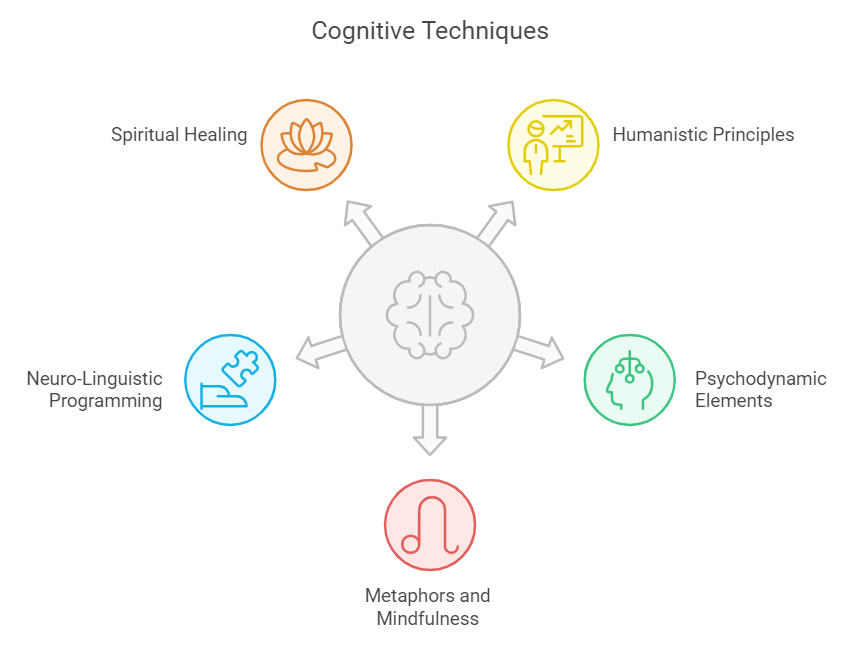
Why Choose an Eclectic Approach for Trauma-Induced Inner Conflicts?
The Complexity of Trauma and Inner Conflicts
Your journey is complex, and so are the inner conflicts born from trauma. An eclectic approach ensures a personalized response to the intricate nuances of your past traumas and current struggles.
Tailoring Therapy to Individual Needs
No two individuals are the same, and neither are their journeys through trauma. Cognitive Hypnotic Psychotherapy’s eclectic nature allows for tailored interventions, ensuring resonance with your experiences and needs.
Comprehensive Healing Through Multiple Modalities
Imagine a therapy as diverse as your challenges. The eclectic nature of Cognitive Hypnotic Psychotherapy encompasses various modalities, addressing the multifaceted impact of trauma on your mind, body, and spirit.
The Role of Hypnosis in Cognitive Hypnotic Psychotherapy
Understanding Hypnosis as a Therapeutic Tool
Demystify hypnosis—it’s not about losing control but gaining access to your subconscious mind. In this altered state of consciousness, you’ll explore, understand, and reframe the narratives connecting past traumas to current inner conflicts.
How Hypnosis Facilitates Integration in Cognitive Hypnotic Psychotherapy
Hypnosis acts as a bridge between your conscious and unconscious processes. It allows you to access deeply buried memories, confront unresolved emotions, and integrate conflicting aspects of yourself. This integration is pivotal for resolving trauma-induced inner conflicts.
Benefits of Hypnosis in Addressing Trauma-Related Inner Conflicts
Unlock the benefits of hypnosis in trauma resolution. It provides a safe space for you to revisit traumatic events, detached from their emotional intensity. Through this process, you can reprocess and reframe these memories, diminishing their impact on present inner conflicts.
Case Studies: Your Blueprint to Freedom
Highlighting Cases of Inner Conflict Resolution
Real-life stories are beacons of hope, illustrating the transformative power of Cognitive Hypnotic Psychotherapy in resolving trauma-induced inner conflicts. These cases show how individuals navigated their intricate pasts and emerged with newfound inner harmony.

Demonstration of the Integrative Power of Cognitive Hypnotic Psychotherapy
These stories not only tell but show how Cognitive Hypnotic Psychotherapy integrates various therapeutic techniques to address trauma-related inner conflicts. From cognitive restructuring to hypnotic regression, witness the versatility and effectiveness of this eclectic approach.
Practical Techniques within Cognitive Hypnotic Psychotherapy
Cognitive Restructuring
Unleash the power of cognitive restructuring, where you identify and challenge distorted thought patterns. Learn to recognize self-limiting beliefs and replace them with healthier perspectives, reshaping your cognitive landscape affected by trauma.
Hypnotic Regression for Trauma Resolution
Experience the transformative journey of hypnotic regression, where you revisit past traumatic events in a controlled and therapeutic setting. By revisiting these events, you can process the associated emotions, leading to resolution and healing.
Mindfulness Practices
Discover the peace within mindfulness practices. In the context of trauma-induced inner conflicts, mindfulness allows you to observe your thoughts and emotions without judgment, fostering clarity and self-acceptance.
Metaphorical Exploration
Embark on a journey of self-discovery through metaphorical exploration. Use symbols and metaphors to delve into your subconscious, gaining a unique perspective on your challenges and potential solutions.
N-Step Reframing for Behavioral Changes
Navigate the terrain of behavioral changes through N-Step Reframing, rooted in Neuro-Linguistic Programming (NLP). Uncover the positive intentions behind conflicting thoughts or behaviors, paving the way for constructive changes.
Application of Void Management Techniques
Guide your internal experiences with void management techniques, often used in hypnotherapy. Manage emotions, sensations, and thoughts to reduce the intensity of inner conflicts and promote emotional stability.
Advantages of Cognitive Hypnotic Psychotherapy in Trauma Resolution
Holistic Healing of Mind and Spirit
Cognitive Hypnotic Psychotherapy is more than just a treatment—it’s a journey towards holistic healing. Trauma affects your mind and spirit, and this therapy addresses the interconnectedness, fostering comprehensive healing.
Long-Term Efficacy in Maintaining Inner Harmony
Experience the long-term efficacy of Cognitive Hypnotic Psychotherapy. By addressing the root causes of trauma-induced inner conflicts and providing a diverse set of tools, you’ll be equipped to maintain inner harmony beyond therapy sessions.
Empowering Individuals Through Self-Discovery and Transformation
The ultimate goal is not just resolution but transformation. Empower yourself through self-discovery. Let Cognitive Hypnotic Psychotherapy be the catalyst for your personal growth, paving the way for a more fulfilling and harmonious life.
Conclusion
In conclusion, the link between past traumas and current inner conflicts is profound. Cognitive Hypnotic Psychotherapy emerges as your ally, offering an eclectic and integrative approach to address the complexities of trauma-induced struggles. Through the power of hypnosis and a diverse set of therapeutic techniques, envision a journey of self-discovery, resolution, and transformation. Acknowledge the interconnectedness of your past and present, and consider the transformative potential that arises from embracing an eclectic approach to healing. The invitation is clear: take that first step towards understanding, healing, and reclaiming inner harmony.
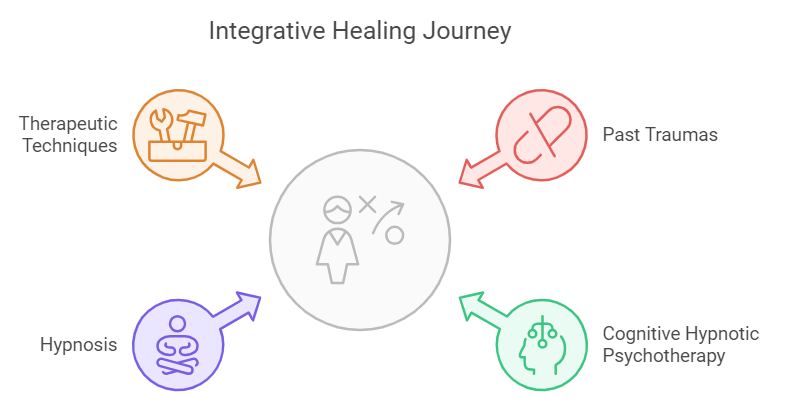
Are you ready to take that first step? Book a free consultation session with us. Let’s embark on this transformative journey together. Click the button below to schedule your appointment and start your path towards inner harmony.

